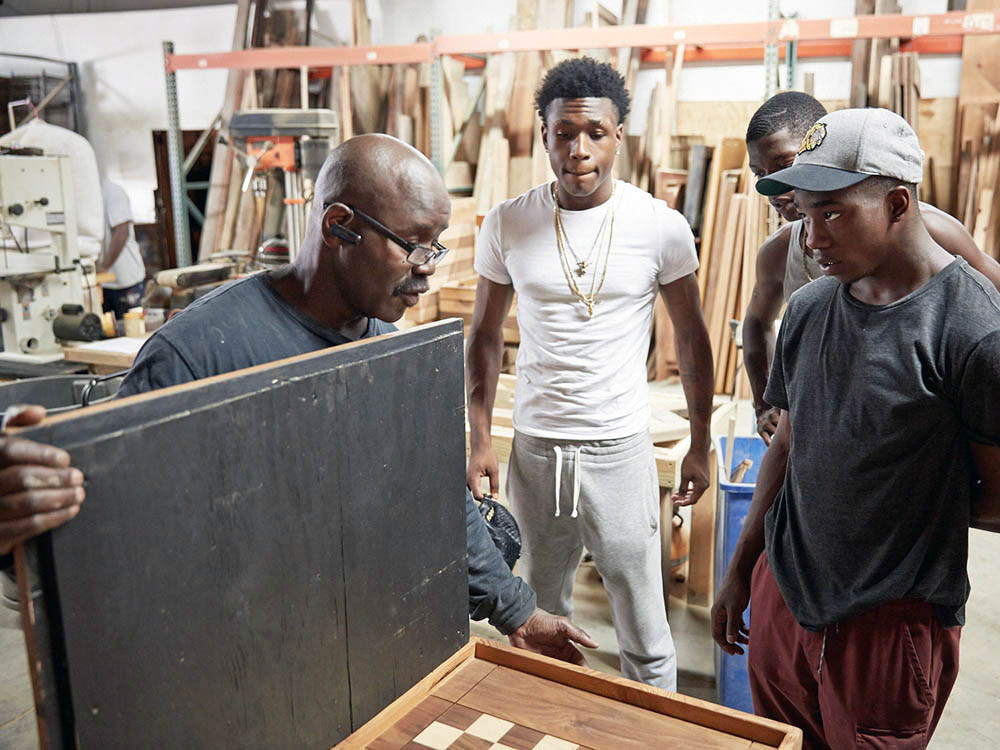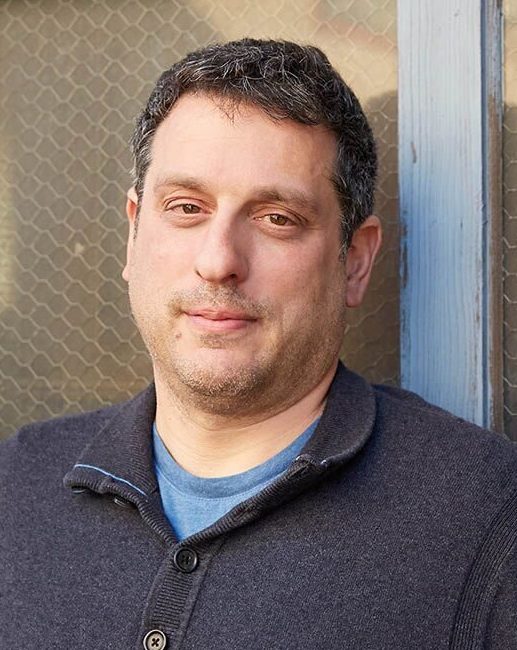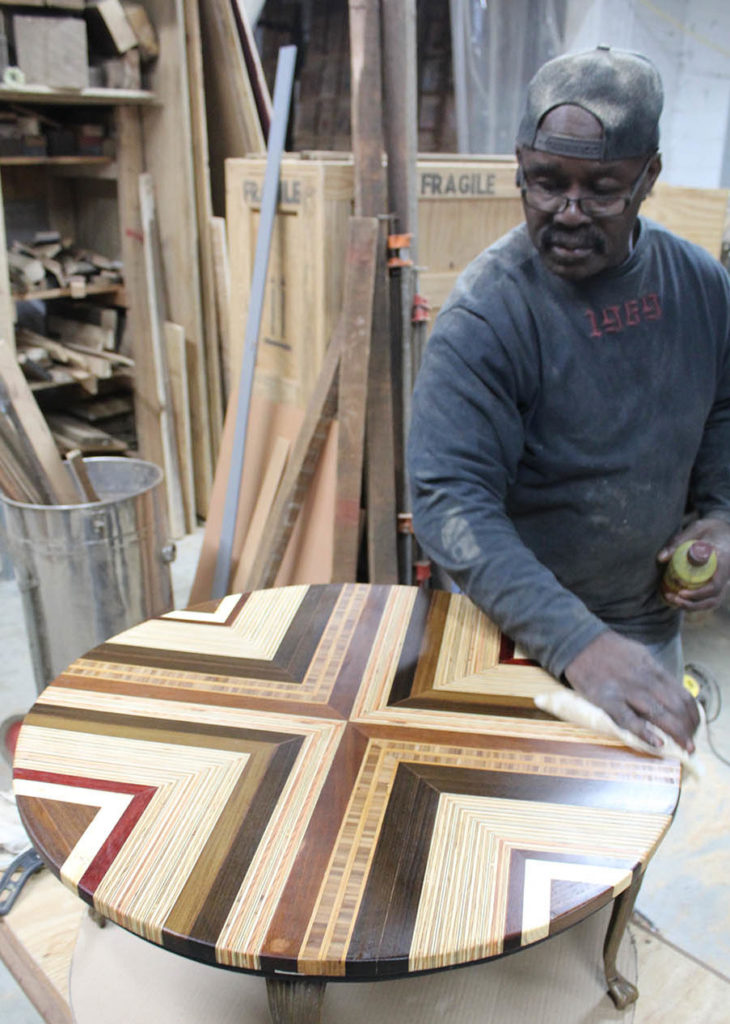How to Get out of Prison and Start Up a Business
Tommy Safian remembers the moment he knew he needed to go for the big job.
As a branding and marketing consultant, he had been called in to offer advice to a startup teaching homeless people how to build furniture. The nonprofit was switching its focus to people who were getting out of prison. Safian had once run a popular furniture store, Nova Zembla, in Brooklyn Heights. So he invited a supplier he had worked with, Cisco Pinedo, to give his perspective from having trained formerly incarcerated people at his furniture company in Los Angeles.
During one of their meetings, which included the organization’s board members, the executive director took a phone call and returned with big news. While the employment rates for former inmates who’ve been out of prison for one year usually stand at 25%, the numbers for their clients—supported by big donations, tons of attention, and strong cheerleading—had reached 30% rates.
“We thought they were going to be wringing their hands. But instead they were pounding their chests and giving each other fist bumps,” marvels Safian. “Cisco and I were looking at them like it was Alice in Wonderland. How could people who are so talented and spend their careers and their free time on all this be so ecstatic with those numbers?”

Manigo teaching visiting youth from the Cases.org program about furniture design and construction (Photo credit: Bryan Coppede)
If Safian and Pinedo had merely been visitors to this world of former inmates, they might have accepted the low expectations. But they both had worked with people re-entering society and knew better. Pinedo had set up shop in South Central L.A. soon after the 1992 riots and given plenty of reentrants a shot. So when they sat down to plot a strategy for the nonprofit, they realized they should try to do the job themselves and prove that the typical re-entry could be vastly improved upon. “We spend over a trillion dollars on criminal justice in this country and we are not getting a return,” says Safian. “We’re keeping our taxes high and guaranteeing failure.”
In most federally funded reentrant job-training programs, trainees are put into six- to eight-week programs, usually in minimum-wage food service jobs or at manual labor in construction. But a minimum-wage job doesn’t get these men stabilized fast enough. Renting an apartment in New York City often requires an income that’s 40 times the monthly rent. In addition, the re-entrants have to pay their parole officers a monthly fee. If the re-entrants had children before their prison time, they’re looking at back payments for child support docked from their paychecks. (One man in the program faces a $40,000 bill.) They have worse than bad credit: They have no credit, which means they can’t borrow from a bank. Safian believed that a business approach could change the game.
Refoundry’s New Beginnings
In 2015, Safian and Pinedo officially launched Refoundry, a company that trains re-entrants to hunt for cast-off materials—wood or leather—and turn them into well-crafted furniture or accessories for sale, all the while turning the re-entrants into entrepreneurs.
The pilot program of nine to 12 months of training, during which the men were paid $18 to $20 an hour in total compensation, plus one to four months of business incubation, graduated four men, with a new arrival finishing the program later. Two of them launched Pen & Pistol, which takes leather scraps and repurposes them as accessories sold at a Soho boutique and featured on Refinery29. James Eleby Jr. designs and crafts furniture for Eleby Designs and Gene Manigo for Kambui Custom Craft, which sell at ABC Carpet and Brooklyn Flea. One trainee is apprenticing with another business in the Brooklyn Navy Yard, where Refoundry has its home base.

Refoundry co-founder and executive director Tommy Safian (Photo credit: Bryan Coppede)
In the process, Safian learned lessons. While teaching his students how to hawk the apprentice-created furniture at the Brooklyn Flea, the organization brought in $140,000 in revenues—30% of operating expenses—proving that nonprofits could be greatly aided by following a profit model. But the initial fundraising challenges proved more onerous. Federal funding is restrictive, discouraging innovation. Big foundations usually want to see a three-year report of achievements, while small foundations require the kind of application process that makes them a time sink from a business perspective.
Safian turned to Kickstarter and his own pocketbook to cover the gap. But he also realized Refoundry needed to increase funding rapidly so they could scale up and have a bigger impact, shifting from a workforce development effort to a criminal justice organization with seven different programs moving inmates from work to entrepreneurship. “We live one life,” says Safian. “Time goes by fast. I want change now. I don’t want to take 40 years to help fix it.”
He hopes private companies will see the benefit of underwriting these efforts since all of these re-entrants, if granted a shot at success, will become potential customers for banks, real estate firms, utilities and hardware stores including Home Depot and Lowe’s.
Funding for the Next Wave
The immediate goal for their carpentry program is to raise $1 million to bring on the next 18 to 25 re-entrants on a rolling basis, starting in summer 2017. But if money comes through for one of the other seven training arms first, Safian will follow that pacing.
Refoundry has no lack of inspirational stories. As Safian says, “You talk to these guys for 90 seconds and you know they were underemployed.” Dexter Nurse describes how significant the metaphor of reclaiming wood is for him. “We were discarded people. Now I get a great feeling that something I made with my hands is something someone liked.”

Manigo putting final finish to the top of a coffee table he crafted from salvaged woods (Photo credit: Emilie Grodman)
James Eleby Jr., who spent the last 32 years in and out of prison, now works designing and building furniture with his son, often putting in 17-hour days. What he likes most about beginning Eleby Designs is “the beauty of it all,” particularly what it has done for him as a father. His son, a soft-spoken, fashionable 22 year old, confesses that he didn’t have that paternal relationship until Refoundry.
“It was his idea,” the younger James says about his working for his dad. “He had this dream of a family business. I was kind of reluctant. Working with family can go in a lot of directions. But every fear or doubt washed away immediately. He is great at giving directions. He is so patient with me.” His father says that Safian trained him the same way.
A Personal History
And then there is the fact that Safian is not just a dewy-eyed do-gooder. Decades ago, a beloved cousin was murdered. His uncle approached the murderer after the trial and said he hoped the man would turn his life around behind bars and ultimately get out to have a relationship with his own son, a chance Safian’s uncle would never have. So does Safian see himself as helping men like his cousin’s murderer, who was released in summer 2015, to get another chance?
He is adamant that he didn’t do this for the perpetrator. “I don’t forgive him,” Safian says. “I’m not doing this to help him. It’s hard to describe. Part of why I’m doing this is to honor my cousin. He’d be proud of what I am doing right now. It has to do with him, my own life, my uncle, my son.” He doesn’t discount the need for people who have violated the law to do prison time. “What I am concerned with is how they come out.”





